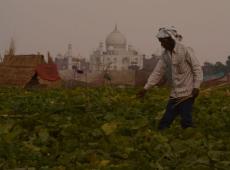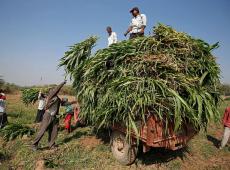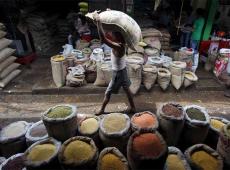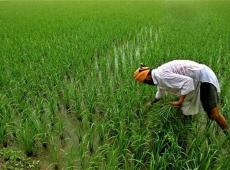Mango Production to Rise 14% in India: ICAR
By Rediff Money Desk, NEWDELHI Apr 03, 2024 14:41
India's mango production is expected to rise by 14% this year, reaching 24 million tonnes, despite a predicted heat wave. ICAR-CISH Director T Damodaran advises farmers on managing irrigation and pest control.

New Delhi, Apr 3 (PTI) India's overall mango production may increase by about 14 per cent to 24 million tonnes this year, ICAR-Central Institute for Subtropical Horticulture Director T Damodaran said on Wednesday.
The India Meteorological Department's forecast of a heat wave in April-May period may not have a significant impact on the mango yield, provided farmers take care of irrigation during May to reduce excessive fruit dropping, he said.
In its latest summer forecast, India Meteorological Department (IMD) has predicted harsher spells of heat waves that could last between 10-20 days instead of the usual two to four days.
Above normal heatwave days are likely to occur over most parts of the south peninsula, central India, east India and plains of northwest India.
"The mango flowering process is a crucial part of the fruit setting process. Thanks to conducive weather, mango flowering is almost over. The pollination is normal and fruit setting has begun. Normal heat waves may not impact yields but will indirectly help the crop," Damodaran told PTI.
The prospects of mango crop are good as of now. Total production could increase to 24 million tonnes in the 2023-24 crop year (July-June), as against 21 million tonnes in 2022-23, he said.
The mango output is seen to be bumper in South India, which contributes 50 per cent of the total country's production. Last year, Southern states faced 15 per cent loss due to weather aberrations. However, the situation is better this year, he added.
Mango is an important fruit crop in India and popularly called the 'King of Fruits'. India is a major mango growing country, contributing nearly 42 per cent of the world's production.
According to Damodaran, climate plays a role in flowering and fruit setting.
However, in the event of an above normal heat wave, farmers are required to take precaution and address the soil moisture stress by ensuring mild irrigation, thereby reducing fruit dropping, he said.
He also advised farmers to be cautious about invasive pest attack, especially thrips insect in mango growing areas of northern plains.
Damodaran said the thrips population has gone up manifolds in many mango orchards.
In search of food, thrips insects will migrate from floral portions to newly formed fruitlets. To save the crop, farmers can immediately spray insecticide especially Imidacloprid of about 4 millilitre (ml) per litre of water or Thiamethaxam of 0.4 gram per litre of water, he said.
There are some mango trees where new flush is seen along with flowers. Since fresh leaves are tender, farmers should take care of Semilooper pests by using Lambdacyhalothrin 0.5 ml per litre along with the above insecticide, he said.
"This will take care of panicle/ fruit midge also. Wherever flower are still opening, spray may be delayed for 2-3 days."
Also, if farmers have not sprayed Hexacanazole of 2 gram per litre of water for control of Powdery Mildew plant disease, they should mix this with the above spray, he added.
The India Meteorological Department's forecast of a heat wave in April-May period may not have a significant impact on the mango yield, provided farmers take care of irrigation during May to reduce excessive fruit dropping, he said.
In its latest summer forecast, India Meteorological Department (IMD) has predicted harsher spells of heat waves that could last between 10-20 days instead of the usual two to four days.
Above normal heatwave days are likely to occur over most parts of the south peninsula, central India, east India and plains of northwest India.
"The mango flowering process is a crucial part of the fruit setting process. Thanks to conducive weather, mango flowering is almost over. The pollination is normal and fruit setting has begun. Normal heat waves may not impact yields but will indirectly help the crop," Damodaran told PTI.
The prospects of mango crop are good as of now. Total production could increase to 24 million tonnes in the 2023-24 crop year (July-June), as against 21 million tonnes in 2022-23, he said.
The mango output is seen to be bumper in South India, which contributes 50 per cent of the total country's production. Last year, Southern states faced 15 per cent loss due to weather aberrations. However, the situation is better this year, he added.
Mango is an important fruit crop in India and popularly called the 'King of Fruits'. India is a major mango growing country, contributing nearly 42 per cent of the world's production.
According to Damodaran, climate plays a role in flowering and fruit setting.
However, in the event of an above normal heat wave, farmers are required to take precaution and address the soil moisture stress by ensuring mild irrigation, thereby reducing fruit dropping, he said.
He also advised farmers to be cautious about invasive pest attack, especially thrips insect in mango growing areas of northern plains.
Damodaran said the thrips population has gone up manifolds in many mango orchards.
In search of food, thrips insects will migrate from floral portions to newly formed fruitlets. To save the crop, farmers can immediately spray insecticide especially Imidacloprid of about 4 millilitre (ml) per litre of water or Thiamethaxam of 0.4 gram per litre of water, he said.
There are some mango trees where new flush is seen along with flowers. Since fresh leaves are tender, farmers should take care of Semilooper pests by using Lambdacyhalothrin 0.5 ml per litre along with the above insecticide, he said.
"This will take care of panicle/ fruit midge also. Wherever flower are still opening, spray may be delayed for 2-3 days."
Also, if farmers have not sprayed Hexacanazole of 2 gram per litre of water for control of Powdery Mildew plant disease, they should mix this with the above spray, he added.
Read More On:
DISCLAIMER - This article is from a syndicated feed. The original source is responsible for accuracy, views & content ownership. Views expressed may not reflect those of rediff.com India Limited.
You May Like To Read
TODAY'S MOST TRADED COMPANIES
- Company Name
- Price
- Volume
- GTL Infrastructure
- 2.93 ( -4.87)
- 226206286
- IFL Enterprises
- 1.30 (+ 4.84)
- 81461564
- Vodafone Idea L
- 16.79 (+ 0.66)
- 67447398
- NCL Research
- 0.95 ( -4.04)
- 31996628
- Franklin Industries
- 3.73 (+ 3.32)
- 21511209
MORE NEWS

Navi Mumbai Airport ILS Signal Testing Begins
The Airports Authority of India (AAI) has begun ILS signal testing at the...

Air India VRS for Non-Flying Staff Ahead of...
Air India has announced a voluntary retirement scheme (VRS) and voluntary separation...
Fisher Groups Oppose WTO Fisheries Subsidy Talks
Small-scale fisher groups from India, Indonesia, and Bangladesh demand WTO keep...












 © 2024 Rediff.com India Limited. All rights reserved.
© 2024 Rediff.com India Limited. All rights reserved.